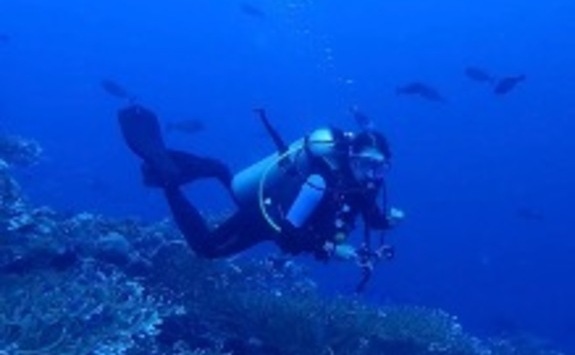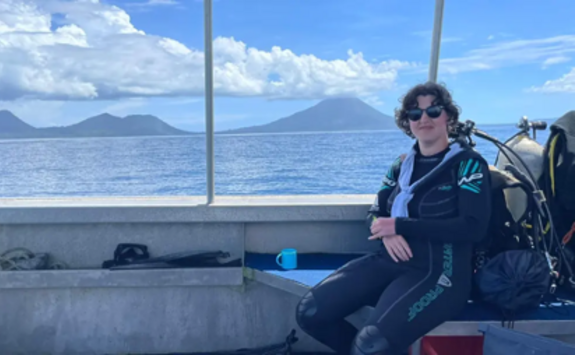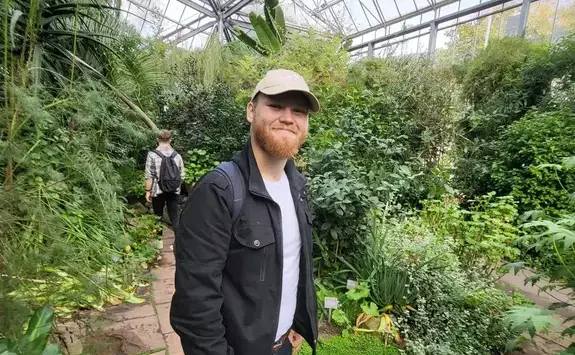Our Postgraduate Researchers
Kirstin Gaffney, PGR
Supervisors: Dr Theresa Rueger
Project title: ‘Pay to stay’ in anemonefish societies.
In many animal societies, subordinate non-breeders perform cooperative behaviours which enhance the fitness of others at an apparent cost to themselves. Whilst these behaviours can often be at least partly explained by high relatedness within groups, marine fishes commonly live in societies of unrelated individuals and therefore kin selection benefits are unlikely to play a role. In anemonefish (Amphiprion spp.), non-breeders have been observed cleaning and massaging the anemone host, defending against predators and food competitors, as well as displaying submission towards dominant breeders.

This project aims to explore the evolution of these cooperative behaviours through testing the ‘pay to stay’ hypothesis which proposes that non-breeders behave cooperatively to appease the dominants in order to avoid group eviction. To investigate this, we are using a combination of field observations and experimental manipulations, as well as applying a social network approach.
Contact information
Email: kirstinkg@gmail.com
Twitter: @kirstinkg
LinkedIn: www.linkedin.com/in/kirstingaffney
Research group: www.drtrueger.com/team
Lucia Yllan, PhD
Supervisors: Dr Theresa Rueger and Dr Heather Sudgen
Project title: The use of acoustic cues in clown anemonefish social hierarchies.
Fish represent 35% of the total chordate biomass and half of vertebrate species but knowledge about acoustic communication in fish is limited compared to other groups. Anemonefish can hear sounds between 75 and 1800 Hz and produce a wide variety of vocalizations using their jaw teeth and vibrations from their rib cage, which generates variation in the sound related to their body size. It is unclear whether acoustic signals are used in a social context such as communication within the group, establishing dominance and assessing competitors, reproductive activities, or individual recognition.

The aim of this PhD project is to fill this knowledge gap and understand the role of acoustic signalling in clownfish social hierarchies. The methods include the setup of GoPros and Audiomoths to record audio and video data on three species of anemonefish (Amphiprion percula, A. perideraion and A. clarkii) in the reefs of Papua New Guinea.
Contact information
Email: l.yllan2@newcastle.ac.uk
Twitter: @LuciaYllan
LinkedIn: www.linkedin.com/in/lucia-yllan-garcia/
Lukas Edwards, PhD
Supervisors: Dr Isabel Smallegange and Dr Heather Sugden
Project title: The eco-evolutionary dynamics of how life histories structure population responses to change through plastic developmental systems.
I am examining the effect of developmental polyphenisms on life-history and population dynamics, using the tubeworm Polydora cornuta as a model species. The aim is to see what environmental cues affect the polyphenism, and to examine how the polyphenism affects the individual’s, and the population’s, resilience to ecological fluctuations. A key element of this project will be examining how polyphenisms mediate the feedback loop between ecology and evolutionary pressures, called “Eco-Evolutionary Dynamics”.

Contact information
Email: L.Edwards7@newcastle.ac.uk
Twitter: @LukasEdwards
LinkedIn: www.linkedin.com/in/lukas-edwards-3152a9216/?originalSubdomain=uk
